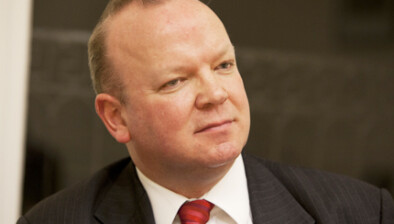Tom O’Malley: A new equality for Ireland’s criminal justice system

Tom O'Malley SC
Tom O’Malley SC explains his interest in sexual offending and the background to his appointment as chair of the review of protections for vulnerable witnesses in the investigation and prosecution of sexual offences.
It all started one miserable winter’s evening in the mid-1980s at Yale Law School in New Haven where I was a student at the time.
I went along to a guest lecture by a local prosecutor who was describing her experience prosecuting rape cases. In those days, strange as it may now seem, sexual offences scarcely featured at all in criminal law courses or textbooks in the US.
At one point during her talk, the prosecutor described one of her recent cases where the accused was elderly and very infirm. At the trial, he was confined to a wheelchair and had some kind of oxygen tent. A student asked her how she felt about the accused in these circumstances. She replied: “All I could think of was how could I stop myself from going over, kicking in his oxygen tent and finishing him off once and for all.”
That episode put me thinking about the notion of partisanship in legal practice, and also about the peculiarly emotive responses, even among professionals, to allegations of sexual offending.
On returning here to NUI Galway in 1987, I began working primarily on sentencing but, largely because of that Yale episode, I maintained an interest in sexual offences as well. In 1992-1993, I was lucky enough to spend a year as a Visiting Fellow at the University of Oxford Criminology Centre. This was the ideal location in which to work on criminal law, especially with access to the Bodleian Library, one of the best in the world, which was an enormous advantage in those pre-internet days.
Eventually, I completed a book, Sexual Offences: Law Policy and Punishment, published in 1996. In it, I tried to eschew the traditional textbook approach by merely describing the law as it stood, though the book did that too. Rather, I wanted to locate the law in broader social and theoretical contexts. It would have been a shame to do otherwise, because the 1980s and early 1990s saw the appearance of some classic works by leading feminist thinkers such as Catharine MacKinnon, Andrea Dworkin, Robin Morgan and Carol Gilligan. I had met some of them during my travels and researches.
A second, and entirely rewritten, edition of the book appeared in 2013, this time under the title Sexual Offences, and I am now working on the third edition.
Meanwhile, as a barrister, I had the opportunity to work on several sexual offence cases in the higher courts. The most relevant of these for present purposes was a case called People (DPP) v C.O’R which I argued before the Supreme Court in 2016.
The legal question there related to what we call the mens rea or mental element of rape. In other words, if a man is charged with rape, does he have a good defence if he can show that he honestly believed the woman was consenting or is it also necessary that his belief should have been reasonable? The Supreme Court held, correctly I would say, that as the law stood, honest belief was sufficient, and the Court was in no position to change the law.
Following on this judgment, the Attorney General (Máire Whelan at the time) referred the question to the Law Reform Commission of which I was also then a member. Having considered the matter at length, the Commission published a report in 2019 in which it recommended that the law should be changed so as to require that belief in consent must be reasonable as well as honest.
It was against that background that in 2018 I was asked by Charlie Flanagan TD, then Minister for Justice and Equality, to chair an inter-agency working group on the treatment of vulnerable witnesses during the investigation and prosecution of sexual offences.
The group consisted of highly experienced representatives of the Courts Service, the office of the Director of Public Prosecutions, the Gardai and the Probation Service. We also got tremendous assistance from Department of Justice officials.
Our remit was to consider the treatment of “vulnerable witnesses” as opposed to “victims”. This was appropriate because a defendant may also be vulnerable by virtue of age or disability, as may other persons who are called to testify.
However, the bulk of the report is devoted to the treatment of victims who, in sexual offence cases, are predominantly women or children. In keeping with best international practice, we recognised that a witness may be vulnerable, not only because of youth or disability, but also because of the nature of the alleged offence and the stressful and, at times, traumatic, experience of having to testify at a criminal trial.
When viewed from this perspective, virtually all sexual offence victims may be classified as vulnerable.
A great deal has already been done in recent years to ease the plight of sexual offence victims. We now have a comprehensive code of criminal offences outlawing all forms of sexual violence, abuse and exploitation against children and adults. The law also provides for a wide range of special measures for assisting children and persons with mental disabilities when giving evidence.
However, following a close examination of the overall system and having consulted with a wide range of interested parties, the Working Group identified several aspects of the system that could be improved.
We addressed a number of key issues including the use of intermediaries to assist with the questioning of vulnerable witnesses both before and during trial, the provision of legal information and advice to victims from the time the offence is committed, measures to reduce delays in the trial process, and training for judges, lawyers and others who deal in a professional or voluntary capacity with victims of sexual crime.
We also recommended that the Government initiate a campaign to promote awareness of the importance of consent in intimate relationships, especially since we now have a statutory definition of consent in Ireland. Many schools and universities are already doing a great deal in this regard and, indeed, NUI Galway has been very much to the fore in cultivating awareness about the meaning and necessity of consent.
Our report was published in July 2020. The Minister for Justice, Helen McEntee, TD, who took a strong personal interest in it, instituted a 10-week implementation programme. I am happy to say that this was done exactly as promised and in October 2020 a detailed implementation plan was published.
Of course, this is one area where we can never claim to have a perfect, or even adequate, set of laws and practices. We continue learn more about the nature, prevalence and impact of sexual violence. As lawyers and policy makers we must always remain ready to respond to what we learn.
- Tom O’Malley SC is a law lecturer and barrister with expertise in criminal law, sentencing, criminal procedure and constitutional law. This article first appeared in Cois Coiribe.








